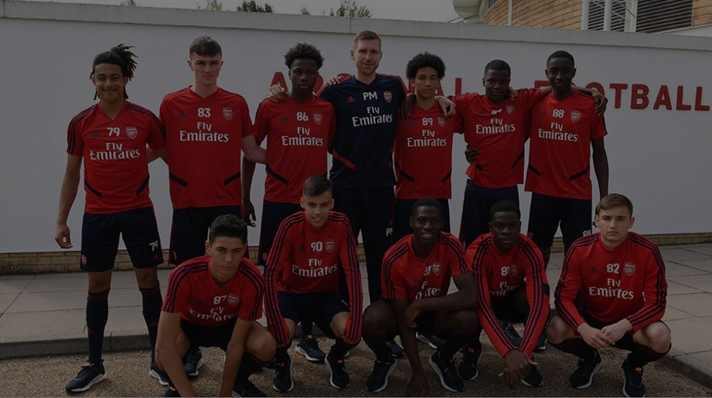After completing a BA (Hons) Sports Business & Sports Law degree at UCFB, Charlie Knowles decided that scouting and talent identification were the areas he wanted to specialise in, highlighting the flexibility and breadth of opportunities within the sports industry.
Here, the UCFB Wembley graduate tells us about his fascinating role at the Premier League club, what his three years as a student were like and the League Two experience that helped him secure the job at Arsenal…

Tell us about your role as Youth Academy Scout at Arsenal and what it involves.
My role at Arsenal has evolved quite quickly since I have been at the club, as with more trust and respect comes more responsibility. When I first started in the role, I was tasked with finding my feet in the environment as I had transitioned from a CAT2 to a CAT1 club. The transition took a little while to adjust to but, with the fantastic CPD delivered on behalf of the club by my line manager, in time I quickly found my feet.
Day-to-day, I typically contact various grassroots club managers in order to attend fixtures with the view of finding players to trial at our academy. That is then followed by an introduction to parents/guardians of the player with the view of a recommendation to trial at the academy. In order for a recommendation to be made to Arsenal, three detailed reports have to be written which adhere to our Pillars Model. These are; Efficient Mover, Effective Team Player and Champions Mentality with the belief that they form ‘Lifelong Learners’ of the game.
What have been some of the highlights of the job so far?
I would say that the biggest highlight of being a scout is the feeling when you recommend a player to the club you work for and they are in agreeance that they should be trialling with us. To go one step further and have players sign at Arsenal that I have recommended is an even greater feeling and one that I have experienced a few times now. There are also parents and children that you build professional relationships with which gives you a natural sense of responsibility to ensure that you are producing the best possible environment for these guys to be in once they are under your care and guidance at Arsenal.
How is scouting changing and growing as a discipline? Where do you see it in 10 years’ time?
For me, scouting is and always will fundamentally be about what you see on the football pitch with your eyes. The aspect that changes, which is commonly known as the “eye test”, is data. With technology and data analysis continually evolving, it is becoming more useful in the game at professional, academy and even grassroots levels. Data becomes useful when analysing athletic performance (something I don’t personally use yet) but will certainly need familiarity with using as I progress and develop in the talent identification industry.
Do I think this is the direction that scouting is heading in? For sure. Hence why I am considering going back to UCFB’s Global Institute of Sport to study an MSc Performance Analysis in Football which would give me a good foundation to build on regarding data analysis. If used correctly, in 10 years’ time, I see the football industry being even more reliant on data to identify and then sign players but for me the “correct” use is where data and the “eye test” can be combined.
🅰️ccess
— Arsenal Academy (@ArsenalAcademy) January 17, 2022
🅰️ll
🅰️reas
📺 Go behind the scenes of #AFCU21's win over Chelsea in the @PapaJohnsTrophy with a focus on Mika Biereth's performance 👇https://t.co/O8vUFw53xO pic.twitter.com/HbaLt6tHUz
Why did you choose to pursue scouting having studied BA (Hons) Sports Business & Law? Do you think the sports industry allows you to go down a range of paths within it?
Scouting offers a good entry route into the industry as it’s where I think the main “hustle and bustle” happens and so you are exposed to how busy and how ruthless the football industry can be. The recruitment side of professional sports in general requires a good knowledge of particular regulations and business processes if you are to progress. The BA (Hons) Sports Business & Sports Law programme covers topics such as safeguarding, managing sports organisations and strategy implementation which are all useful areas to understand in depth when working in professional football.
I most definitely believe that the sports industry allows for a range of paths within as we are now seeing football clubs becoming multi-billion dollar businesses and with that comes more opportunities in various sectors of the business such as facilities management, ticket sales, accountancy, business development, community relations and so on.
During your degree, you were an Academy Scout at Colchester United. How important do you think having this experience was in securing your current role at Arsenal?
This was what probably set me up to transition so easily into the role. The experience I gained at Colchester working with Jake Swan (a former UCFB student and now head of London Recruitment for Colchester) has stayed with me until now and will continue to stay with me throughout my time in football. His Nando’s sauce choice has certainly improved! The experience gained in the voluntary role there was so important as it enabled me to understand how the academy system works in its entirety before joining Arsenal, so that I was best equipped when embarking on my first paid role in football.
How did you find your time at UCFB?
I found my time at UCFB very good. If I were to break it down into the three years, first year was a good challenge as I was able to find my feet in particular classes with lecturers who really understood the industry. Second year started off the same but was then hit with the pandemic and so everything was adjusted to follow government guidelines. I must compliment the work of all lecturers during this difficult period as they adapted very quickly and were able to deliver top class lessons which enabled me to get the best possible grade (First Class Honours). Year Three was a smoother process as we were all used to the restrictions placed on us by Covid and so just had to get on with more independent studying where exams had been converted into coursework essays.
All in all, I very much enjoyed my time studying at UCFB as everything was geared around preparing students to embark on journeys specifically within the sports industry with most modules actually applicable to other business sectors too. Special mention to lecturers Alex and Alessandra in Law, Paul Brewster in Accounting & Finance and Jason Stephens in Business; all were super supportive throughout the three years.
What advice would you pass onto anyone looking to study at UCFB or GIS?
My advice to any prospective students at UCFB would be to make the most of the vast industry contacts that the university possesses as well as the work experience opportunities on offer to all students. My time at Colchester really did contribute to who I am as a scout now. Enjoy the modules you are learning about and really go out of your way to ensure that you study the topic in its entirety to be better equipped for essays and exams. Lastly, whenever you get an essay set for coursework, open the word document and title in the same day that you receive the assignment brief, keep the page open at all times as a small tab on your laptops/tablets and just graze in and out of the document over time to ensure that you are maximising your time.














